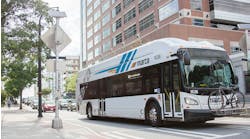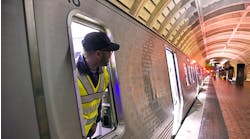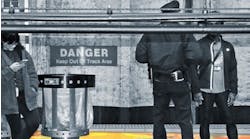Three out of four travelers (75 percent) who use public transportation in some of the world’s major cities believe that electronic ticketing would make travel easier, and an overwhelming 92 percent would welcome paperless travel, a new global survey by Accenture reveals.
The survey of 4,500 urban travelers in nine major cities in Brazil, France, Germany, South Korea, Spain, UK and the United States showed that approximately 90 percent of people in these cities use public transportation on a regular basis, and they are willing to pay more for technology improvements. According to the survey, 52 percent of respondents would be willing to pay at least 10 percent more for travel if they were offered such technological enhancements as the ability to use a smartphone as a ticket while traveling, an app from transport providers and/or a paperless travel option.
When asked what motivates their interest in paperless travel, 88 percent cited time savings as the biggest factor. The survey also revealed that nearly all respondents (93 percent) are interested in being able to purchase a single ticket for multiple modes of transportation. If a single ticket option were made available, two thirds of the travelers surveyed — 66 percent — said they would use that option on a daily basis. In addition, 76 percent of travelers believe that a paperless system would encourage drivers to start using public transport
Travelers want technology to be better integrated into public transportation and for public transportation providers to embrace social media
Not only do travelers want technology updated and integrated into their transport infrastructure, they also want more frequent communication from and greater access to the transportation providers via social media:
Fewer than 25 percent of consumers surveyed say they receive communication from public transport companies via social media on a daily basis. However, more than 90 percent of those respondents said they are interested in hearing about the latest transport prices and promotions and receiving information on late-running trains and alerts, changes in timetables and new technology through social media
Approximately one -third of the respondents believe they will be purchasing travel tickets via a mobile device during 2013, rising to 78 percent in 2014. However, 66 percent do not believe that they currently have the option to purchase tickets using their smartphone.
The survey also showed little difference by age when it comes to using social media for public transportation-related information: 63 percent of respondents over 65 years old intend to, or already follow, public transport providers on Facebook and 42 percent on Twitter. The same group is also open to receiving notifications via social media. However, only about half say they receive communication via social media on a weekly or daily basis from transport providers.
“Consumer technology is driving a huge expectation for flexible travel – an expectation that transit agencies cannot afford to ignore,” said Philippe Guittat, global managing director of Accenture’s Transportation Practice. “Travelers believe that price, technological change and consumer demand will drive the provision of paperless travel, and transport companies need to address developments in areas such as smartphone applications and social media strategy if they are to get ahead of the competition.”
Consumer expectations for greater communication and engagement with transportation providers reinforces one of the key digital trends identified in the Accenture Technology Vision. Public transport organizations should look to create “digital relationships” with travelers to improve interactions, develop better insights into individual preferences, and deliver a more valuable and customized consumer experience.
Consumers still feel there are a variety of potential improvements that could be made to current transport systems in addition to innovation in technology and communication. When asked what could make their public transport experience more enjoyable, 84 percent cited less queuing as the biggest improvement that could be made, followed closely by implementing self-service ticketing (82 percent) and 24-hour services (81 percent).
Americans use social media for travel the most, Spaniards want remote purchasing and Londoners want to save time
Consumer interest in paperless travel and technology-enabled improvements in this sector are universal. However, some city-specific findings emerged in the survey:
- Seoul — 30 percent of respondents believe they have the option to pay for public transport using their smartphone and 88 percent agree that paperless journeys are appealing. Additionally, 82 percent noted that if they had the option to use one ticket for multiple modes of transportation, they would use it on a daily basis.
- Sao Paolo — 92 percent of consumers find the idea of paperless travel appealing. At the same time, however, Sao Paulo residents expressed more concern than residents of any other city that this would make it easier for criminals to obtain tickets. Currently only 14 percent of Sao Paulo respondents believe they have the option to pay for public transportation with a smartphone, and they are most concerned about ease and saving time during travel. Additionally, 91 percent of the respondents in Sao Paulo rated self-service ticketing as the biggest improvement that could be made to the current system, a higher percentage of respondents than in any other city represented in the survey.
- Los Angeles — Los Angeles residents (along with New Yorkers) claim to be the most digitally connected respondents. Three-quarters (75 percent) already follow or intend to follow public transport providers on social media. However, only 20 percent receive information from a public transport company on a daily basis on social media platforms. Additionally, 61 percent of Los Angeles residents, more respondents than in any other city, say they would switch to paperless travel if it would benefit the environment.
- New York — Similar to Los Angeles respondents, 75 percent of New Yorkers already follow or intend to follow public transportation providers on social media but only 20 percent receive information on a daily basis from public transport companies through social media channels. Only 44 percent of New Yorkers say they would be inclined to switch to paperless travel for environmental reasons. New Yorkers are the most concerned with queuing, with nearly all (93 percent) of respondents choosing less queuing as the biggest improvement that they believe could be made to the current transport system.
- Washington, D.C. — More than residents of any other city represented in the survey, 71 percent of Washington respondents receive information via social media on a daily and weekly basis from public transport companies, and more than 50 percent already follow or intend to follow public transport providers on Facebook and Twitter. Only 36 percent of Washington respondents believe they have the option to pay for public transit using their phone/smartphone, compared to 59 percent of New Yorkers and 60 percent of Los Angeles respondents. Additionally, 87 percent of respondents say they would find it easier to use public transport if queuing is eliminated, and 67 percent believe they will purchase most of their travel tickets via their mobile/smartphone within the next two years. Among the Washington respondents, 79 percent indicated that they believe a paperless system would encourage some drivers to start using public transport.
- Berlin — Travelers in Berlin are much more focused on future technologies that involve communication and information systems. Nearly all (92 percent) — more respondents than in any other city — said they would start using paperless travel if they could overcome security concerns. Additionally, 44 percent, almost double the number of respondents in other cities, agree that earning credit for future travel tickets would be a good incentive for changing their transport behavior.
- Paris — Even though Parisians desire less technology updates and communication via social media, they are still interested in a paperless and one-ticket transport system. Nearly all (95 percent) of Parisians are interested in single-ticket travel. However, they agree that more than anything, legislation, regulation and price will ultimately determine whether paperless travel becomes the norm. Parisians scored the highest when it came to punctuality of travel as the biggest improvement that they believe could be made to the current system (90 percent), and 84 per cent say they want 24-hour services.
- Barcelona — 90 percent of travelers in Barcelona — the highest number of respondents in all cities — agree that they would be incentivized to start using paperless travel if they were given the option of purchasing tickets remotely. Respondents also agree that punctuality and no queuing would make traveling on public transport easier.
- London — Travelers cite punctuality as the biggest public transit improvement (83 percent) that they would like to see. Just over half of Londoners surveyed, 54 percent, would use either Facebook or Twitter to find out about delays, and 63 percent would use social media to give customer feedback. While 74 percent of Londoners believe that paperless journeys are important to business travelers, 67 percent of them believe that incentives must be offered in order to make the switch compelling. And, 88 percent of Londoners say that given the choice, they would only purchase their tickets when on board, using train Wi-Fi.
Mike Wilson, managing director of Accenture’s transportation practice in North America said, “Companies need to deal with customers on their terms — by providing them with transit options that meet their needs — when where and how they want it, and that requires that the interaction be relevant to the situation and their needs at the time.”



